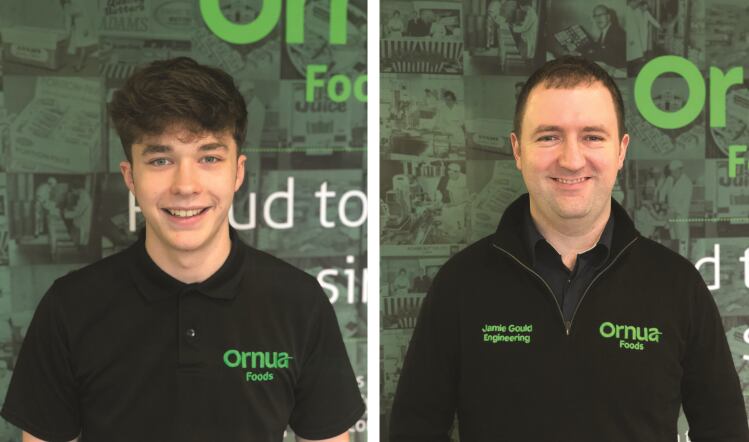Personalisation. It’s a buzzword you will hear permeating every inch of the food and drink supply chain. From personalised nutrition to 3D printed gummy sweets, this trend shows no sign of waning – and that rings just as true within the training provider space.
Supporting more than 1,000 apprentices on training courses at any one time, Remit Group is leading the charge in the world of personalised training programmes and apprenticeship schemes for food and drink manufacturers.
The training provider offers a range of Level 2 to Level 5 apprenticeships across food manufacturing, from process operators to butchery programmes, which it delivers through a three-phase approach: online learning, face-to-face sessions with development coaches and custom workshops on topics specific to the employer.
From its youngest apprentice, aged 16, to its oldest at 62, it understands that to mould engaged, committed apprentices, you need to create an experience tailored to the role for which they are training.
Contextualising learning
“The importance when working with any employer, whether they are big or small, is building into the apprenticeship programme the opportunity to contextualise the learning to that particular organisation or [the apprentice’s] particular job role,” explains Remit national accounts director Fiona Hawkesley. “We will build in elements that are linked to standards, but are tailored for that particular employer – and that adds a great deal of value.
“Whenever we start working with an employer, we sit down to understand their cultures, values and the objectives they want to get out of the programme. Then, we will build a programme based around the standard and the end-point assessment, but also explore with the employer the things that are specific to them.”
One such example involved an employer keen to reduce waste within his company, resulting in a project being built into the apprenticeship programme, which tasked the apprentices with tackling that particular challenge.
“As a result, the employer can then measure a return on investment,” Hawkesley continues. “In this particular example they implemented the project the learners had come up with – around reducing wastage in a part of the production process – and saved the business about £100,000 a year. That’s a really important part of a successful training programme – making sure we are working closely with the employer so it’s fit for purpose.”
For Remit, the aim is to create a training programme or apprenticeship scheme that fully integrates into an employer’s business, as if it had developed the programme from scratch itself. “We’ll look at their branding, terminology and techniques, which we can weave into the programme. That way, employers feel the benefit of the apprenticeship programme more than just if we delivered something just ‘off the shelf’,” she explains.
Engagement with employers
Remit’s development of tailor-made programmes stems from a higher engagement with employers since the Apprenticeship Levy was introduced in April 2017. Now, forced to contribute financially towards staff training – after previously relying on Government funding and grants – employers are keen to have a say in how their money is being spent.
Employers are also using apprenticeships to plug skill gaps and upskill existing staff within their businesses. “Many employers are looking at how they might develop management skills, for example, which helps support productivity, and the retention and development of current employees,” says Hawkesley.
No matter how challenging the Levy might be for businesses, there is a constant flow of apprentices making their way into the food and drink industry. It falls on Remit’s shoulders to create quality out of the quantity and this, in turn, has fuelled a shift in the type of learning offered.
“What we’re looking to do is develop skills, knowledge and behaviours,” Hawkesley continues. “And the work around behaviours, measured throughout the programme, links very closely back into the development of soft skills, including communication and working with a team.
“It’s now an integral part of the programmes we offer and the standards we’re delivering. We’re looking at having a rounded programme that focuses on ‘have I [the apprentice] got the knowledge to do a particular job or role, do I then put that knowledge into a practical application and, alongside that, how am I developing the proper skills?’”
Brexit-affect
Securing apprentices for food and drink manufacturers has become a more pressing matter in the run-up to Brexit. With the risk of EU nationals being prevented from entering the country to work in their factories, food firms need to do what they can to boost retention and “fill any future skills gaps that employers might feel they have”, Hawkesley adds.
Despite playing a major role in the future of thousands of apprentices in the food and drink industry, Remit has identified a number of areas where it wishes to expand in the future, as Hawkesley explains: “We are exploring different types of programmes within food manufacturing – abattoir is one – and we’re looking at how we can link that into supply chain and logistics programmes and continue to add value to the programmes.
“We’re keen to encourage people to take their career further than the level we can offer and we can recommend certain universities that might deliver those higher levels.”
With an overall aim for more engaged apprentices, who remain committed to their employers and go on to secure promotions within the business, Remit’s personalised programmes are helping to forge a sustainable future for skilled staff in the food and drink manufacturing industry.
Remit Group
Number of apprentices: More than 1,000 being trained at any given time.
Food and drink manufacturing courses: Food and drink process operator, Level 2 and Level 3; bakery, butchery and fishmongery – all Level 2; operations and team manager, Level 3 and Level 5.
Works with: Tulip, Bakkavor, Tangerine Confectionery, Natures Way Foods and Thanet Earth.
Success story: Agricultural giant Thanet Earth has saved £28,000 through the work of one of its apprentices and has put 34 apprentices through various different apprenticeships with Remit Food, ranging from Level 2 qualifications in food industry skills to higher-level apprenticeships in management. This has included upskilling existing employees within the business.
Training is carried out on-site at Thanet’s Kent facility, with each apprentice getting regular visits from Remit’s development coaches.




